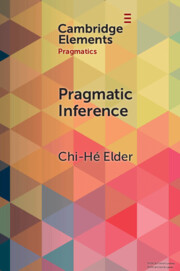Element contents
Pragmatic Inference
Published online by Cambridge University Press: 19 March 2024
Summary
- Type
- Element
- Information
- Series: Elements in PragmaticsOnline ISBN: 9781009036672Publisher: Cambridge University PressPrint publication: 21 March 2024
References
- 7
- Cited by

